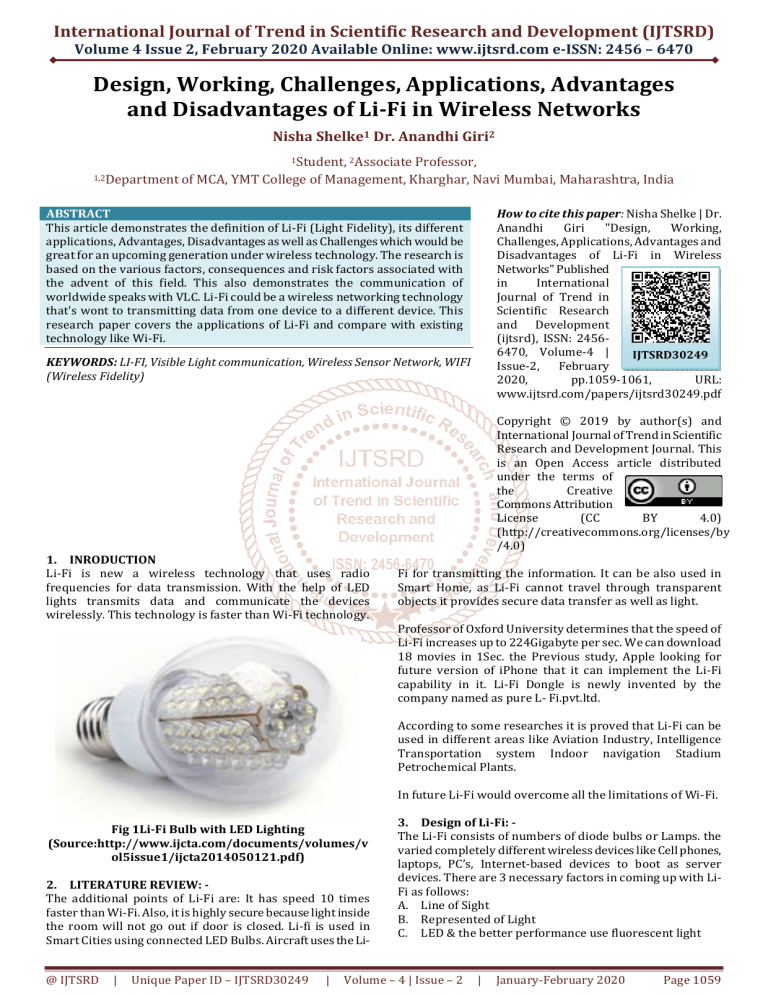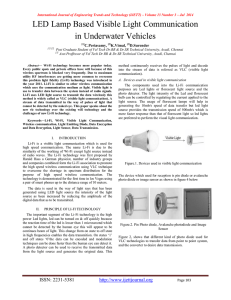
International Journal of Trend in Scientific Research and Development (IJTSRD)
Volume 4 Issue 2, February 2020 Available Online: www.ijtsrd.com e-ISSN: 2456 – 6470
Design, Working, Challenges, Applications, Advantages
and Disadvantages of Li-Fi in Wireless Networks
Nisha Shelke1 Dr. Anandhi Giri2
1Student, 2Associate
1,2Department
Professor,
of MCA, YMT College of Management, Kharghar, Navi Mumbai, Maharashtra, India
How to cite this paper: Nisha Shelke | Dr.
Anandhi
Giri
"Design,
Working,
Challenges, Applications, Advantages and
Disadvantages of Li-Fi in Wireless
Networks" Published
in
International
Journal of Trend in
Scientific Research
and Development
(ijtsrd), ISSN: 24566470, Volume-4 |
IJTSRD30249
Issue-2, February
2020,
pp.1059-1061,
URL:
www.ijtsrd.com/papers/ijtsrd30249.pdf
ABSTRACT
This article demonstrates the definition of Li-Fi (Light Fidelity), its different
applications, Advantages, Disadvantages as well as Challenges which would be
great for an upcoming generation under wireless technology. The research is
based on the various factors, consequences and risk factors associated with
the advent of this field. This also demonstrates the communication of
worldwide speaks with VLC. Li-Fi could be a wireless networking technology
that's wont to transmitting data from one device to a different device. This
research paper covers the applications of Li-Fi and compare with existing
technology like Wi-Fi.
KEYWORDS: LI-FI, Visible Light communication, Wireless Sensor Network, WIFI
(Wireless Fidelity)
Copyright © 2019 by author(s) and
International Journal of Trend in Scientific
Research and Development Journal. This
is an Open Access article distributed
under the terms of
the
Creative
Commons Attribution
License
(CC
BY
4.0)
(http://creativecommons.org/licenses/by
/4.0)
1. INRODUCTION
Li-Fi is new a wireless technology that uses radio
frequencies for data transmission. With the help of LED
lights transmits data and communicate the devices
wirelessly. This technology is faster than Wi-Fi technology.
Fi for transmitting the information. It can be also used in
Smart Home, as Li-Fi cannot travel through transparent
objects it provides secure data transfer as well as light.
Professor of Oxford University determines that the speed of
Li-Fi increases up to 224Gigabyte per sec. We can download
18 movies in 1Sec. the Previous study, Apple looking for
future version of iPhone that it can implement the Li-Fi
capability in it. Li-Fi Dongle is newly invented by the
company named as pure L- Fi.pvt.ltd.
According to some researches it is proved that Li-Fi can be
used in different areas like Aviation Industry, Intelligence
Transportation system Indoor navigation Stadium
Petrochemical Plants.
In future Li-Fi would overcome all the limitations of Wi-Fi.
Fig 1Li-Fi Bulb with LED Lighting
(Source:http://www.ijcta.com/documents/volumes/v
ol5issue1/ijcta2014050121.pdf)
2. LITERATURE REVIEW: The additional points of Li-Fi are: It has speed 10 times
faster than Wi-Fi. Also, it is highly secure because light inside
the room will not go out if door is closed. Li-fi is used in
Smart Cities using connected LED Bulbs. Aircraft uses the Li@ IJTSRD
|
Unique Paper ID – IJTSRD30249
|
3. Design of Li-Fi: The Li-Fi consists of numbers of diode bulbs or Lamps. the
varied completely different wireless devices like Cell phones,
laptops, PC’s, Internet-based devices to boot as server
devices. There are 3 necessary factors in coming up with LiFi as follows:
A. Line of Sight
B. Represented of Light
C. LED & the better performance use fluorescent light
Volume – 4 | Issue – 2
|
January-February 2020
Page 1059
International Journal of Trend in Scientific Research and Development (IJTSRD) @ www.ijtsrd.com eISSN: 2456-6470
According to the incoming binary codes: switching “ON” the
LED implies logical '1’ and switch “OFF” the LED implies ‘0’.
Fig 2: Architecture of Li-Fi
(Source:https://www.researchgate.net/publication/2
95778250_A_Survey_on_LiFi_Technology)
Fig3: Li-Fi transmission
(Source:http://www.internationaljournal/IJECE/2015
/Volume2-Issue3/IJECE-V213P07.pdf)
4. Working of Li-Fi:-
5. Advantages: Li-Fi is wireless technology, communication through LEDs
and other different light-weight sources, which makes the
general system at a low price.
1.
2.
3.
Fig4: Working of LIFI
(https://www.ijser.org/researchpaper/Light-FidelityThe-future-technology-In-Wirelesscommunication.pdf)
4.
5.
Li-Fi is a VLC wireless technology which transfer information
through illumination takes place by taking the fiber optics
associated with causation data through a light-emitting
diode light-weight bulb whose intensity keeps on varied at a
really high speed. This technology includes information
that's unlicensed, thus it will be used for any application like
streaming of video and music. It will access the web on a
streetlight or will transfer a motion picture, music, images,
videos from the lamp. This technology may virtually 'throw
light-weight on' the way to meet the ever-increasing demand
for high-speed wireless connectivity. rather than Radio
waves, lightweight waves have replaced this technology
referred to as Li-Fi. In this technology, LEDs should be
switched ‘ON’ and ‘OFF’ at a quicker rate in order that even
the human eye cannot detect. This will cause the light source
to appear ‘ON’ continuously. The working of Li-Fi is very
easy to understand. In Li-Fi System, there is a light emitter
on one end (i.e.) an LED transmitter. The data input to the
LED transmitter is encoded into the light that is based on
Visible Light Communication, by changing the blinking rate
at which the LEDs blink ‘ON’ and ‘OFF’ to generate different
strings of 0s and 1s. Because the LED intensity is modulated
very quickly that the human eye cannot detect. So the lightweight of the LED constant to which might alter the
transmission of information within the light-weight form
@ IJTSRD
|
Unique Paper ID – IJTSRD30249
|
Connectivity: With the help of light we can access
internet in Classroom, Conference hall, Laboratories,
Aircraft.
Capacity: - Light has 10000 times broad information
measure than radio waves and a light-weight supply is
formerly connected.
Efficiency: -As we know light absorbs less energy and it
is highly efficient, data transmission is cheap as compare
to LED’s.
Availability: - Light sources are measure out each and
every direction. Li-Fi can be implemented by
commutation light i.e. bulbs by LED for higher
transmission information.
Security: -Light waves do not access with walls and this
technology cannot pass through transparent objects so
data transmission is more secure. No one can misuse.
6. Disadvantages: It is a unidirectional network that enables downloading
however no uploading from the connected device.
1. The Light cannot access through walls and contains a
mounted field process
2. Other light-weight sources except for Li-Fi design like
LEDs, will limit the speed of information transmission.
3. Particle to particle communication is accessible.
4. This works only with a Horizontal/direct line of view.
5. Limited range of connectivity.
6. Unavailability of compatible technology.
7. Light interference and Light Pollution.
7.
Challenges: Uplink
Light off mode
Light Interference
LED Modulation Bandwidth
Commercialization
Backout Integration
Volume – 4 | Issue – 2
|
January-February 2020
Page 1060
International Journal of Trend in Scientific Research and Development (IJTSRD) @ www.ijtsrd.com eISSN: 2456-6470
8.
Applications: Li-Fi used light rather than radio frequency signals.
No License is required for the Li-Fi.
Millions of lamps can be transferred information.
Underwater within the sea, Wi-Fi doesn't work on
wherever Li-Fi can work.
It uses radio broadcast Systems.
Li-Fi can solve problems like the shortage of frequency
information measures.
It may be utilized in Medical instruments.
It will use Li-Fi in hospitals and aircraft.
9. Comparison Between Li-Fi and, Wi-Fi and other Radio Communication technologies
Wi-Fi (Wireless Fidelity)
LI-FI (Light Fidelity)
WI-FI is sending information to use of radio waves LI-FI transmits data using light with the help of
with the help of a Wi-Fi router.
LED bulbs.
Speed up to 2 Gbps can be achieved commercially
Speed of 1 Gbps is in use commercially
Short Frequency range 2.4GHz to 5GHz
Frequency range 10 thousand times more than
radio waves
Wi-Fi has a range of 30 meters
Li-Fi Coverage distance of About 10 meters
Takes up more power to operate
Consumes less power
Wi-Fi signals cannot be blocked by walls so signal Cannot pass through walls, so data is protected
needs to use more secure technique to protect data
and more secure
In Wi-Fi data can be transferred at 150Mbps with use In Li-Fi, data can be transferred at 1 Gbps
of WLAN
(Source:https://www.google.com/search?q=difference+between+lifi+and+wifi&oq=di&aqs=chrome.2.69i57j35i3
9l2j0l3.8178j0j7&sourceid=chrome&ie=UTF-8)
10. Analysis: By the previous history of researchers and research papers
referred are able to perceive Li-Fi for smart simplicity. The
papers define that Li-Fi is faster data transmission
technology as compared to Wi-Fi, also it is bidirectional and
fully broadband wireless technology. The comparison
between Li-Fi and Wi-Fi technologies we come to know the
features of Li-Fi over Wi-Fi. Light in windows, room, cars,
lecture rooms can access wireless network. It is the great
invention in wireless technology. Researchers Documents
indicates that a future network goes to be faster but
capability complications would possibly still keep. A Li-Fi
access level can serve multiple users at constant time inside
the planet of its quantity of cash. The communication is
reliable, faster and more secure.
11. Conclusion: If Li-Fi comes into the image at intervals the longer term it
would overcome. The all limitations of the native space
network. The use of Li-Fi can replace radio-based wireless
technologies. Li-Fi is free and provides a secure and safe
internet facility. This technology helps to unravel the matter
of a short radiofrequency system of measurement, ideas and
points that square measure targeted feature and unit of
measurement its consequences operative if this Li-Fi
technology becomes powerful. This technology is placed to
utilize, each bulb will give a one-factor style of a Wi-Fi
hotspot to assist transmit wireless proceed toward the
answer, safer and higher future.
Conference on Innovations in Micro-electronics, Signal
Processing and Communication Technologies (VIMPACT-2016) February 2016, ISSN: 2349-6010.
[4] A Real Time Data Transmission with LED Bulb using LiFi Technology, Khizer Mohsin Rashid Husain, IJSTE International Journal of Science Technology &
Engineering | Volume 3 | Issue 09 | March 2017|ISSN
(online): 2349-784X
[5] https://www.slideshare.net/shwrvppt/lifi-technology31530859
[6] https://www.techworld.com/data/what-is-li-fieverything-you-need-know-3632764/
[7] A Comprehensive Study, Ekta1, Ranjeet Kaur2,
International Journal of Computer Science and Mobile
Computing, ISSN 2320–088X|IJCSMC, Vol. 3, Issue. 4,
April 2014, pg.4754819.
[8] Li-Fi: Internet through Light, Shubham Panjwani1,
Abhinav2, Aishwarya Varshney3, International Journal
of Computer & Mathematical Sciences IJCMS ISSN 2347
– 8527|Volume 6, Issue 3 March 2017.
[9] http://www.academia.edu/Documents/in/Lifi.
[10] https://www.engpaper.net/li-fi.htm.
[11] https://www.researchgate.net/publication/28817544
6_Overview_Li-Fi_Technology
[12] (Light Fidelity)-The future technology In Wireless
communication, ANUJ BORKUTE, ALOK PADOLE, Issue
12, December-2013 153|ISSN 2229-5518.
12. REFERENCES
[1] Accessing the Internet through light using Li-Fi, Ms.
Poonam Konde, Mr. Prashant Shimpi, International
Journal of Trend in Scientific Research and
development
(IJTSRD),
ISSN
No:
24536470|www.ijtsrd.com|volume-2|Issue-4.
[13] Artical:
https://www.researchgate.net/publication/31733923
7.
[2] Li-Fi the Future Bright Technology in Wireless
Communication, Mohammed Abdul Malek Ahmed,
ISSN: 2277 128X|Volume 6, Issue 3, March 2016.
[14] https://www.google.com/search?q=difference+betwee
n+lifi+and+wifi&oq=di&aqs=chrome.2.69i57j35i39l2j0
l3.8178j0j7&sourceid=chrome&ie=UTF-8.
[3] A Review Paper on Li-Fi Technology, Kratika
Khandelwal Sandeeo kumarjain, IIJIRST National
[15] https://en.wikipedia.org/wiki/Li-Fi
@ IJTSRD
|
Unique Paper ID – IJTSRD30249
|
Volume – 4 | Issue – 2
|
January-February 2020
Page 1061






